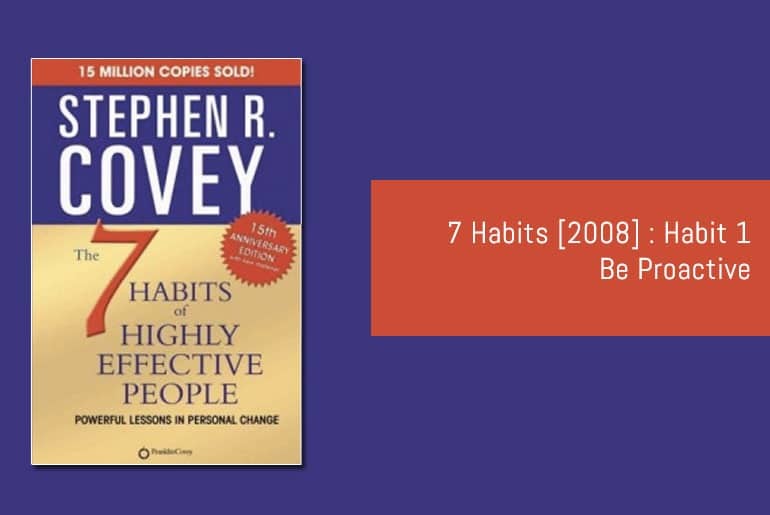7 Habits: Habit 1 – Be Proactive
In Habit 1 of Stephen Covey’s 7 Habits we take a look at the importance of proactivity. We don’s have to leave it to others to ask for help – we can recognise that they need assistance before they ask and it’ll help build important bridges with the people you’re dealing with.

Need a bit more advice on this subject? Check out these books
He describes how we have we have our own “Circle of Influence“, an area of our lives that we have personal control over and can do something about if we’re unhappy about an area of our lives.
The size of our circle of influence depends on how proactive we are; the less proactive, the smaller the circle of influence; the more proactive, the larger the circle of influence.
Covey also describes how we also have a “Circle of Concern“, areas of our lives over which we have no control. To illustrate these two circles that affect our lives:
Circle of Influence
- Having an annoying co-worker/boss
- Wanting a new car
- Learning a new skill
- Making more friends/meeting new people
Circle Of Concern
- Natural disasters
- The global “Credit Crunch”
- Governmental decisions
- Traffic Jams
Too often we focus on our circle of concern, things that we have no control over and have no chance of affecting, rather than our circle of influence which we can directly control.
Why do we do this? I personally think that it’s because we fear taking responsibility for our actions. Covey, on the other hand, seems to attribute it to the fact that we’re “conditioned” into thinking that our circumstances (work, financial, relationships etc.) are beyond our control and we’re essentially stuck with what we have.

Covey spends a great deal of the chapter discussing paradigms – the “maps” and belief systems that govern the way that we live our lives. An excellent example that Covey gives is that if you were asked to find a certain place in City A, but were given a map to City B, there is no way you could reach your destination – except by accident and it would take a long time! We’d end up wandering aimlessly blaming poor street signage and the like rather than the map (and ourselves).
If we were to be more “effective” then we’d use Covey’s proactivity habit; we’d be proactive and ask someone for directions; we’d realise we were using the wrong map and buy a new one.
What I learned from Habit One
The main thing I took away from this chapter is that we seem to be lacking a sense of personal responsibility, that everyone else is to blame. This chapter drives home the fact that it’s not them, it’s me; it’s not I can’t, it’s I won’t.
If I am unhappy with a situation, it’s up to me to change that situation, it’s within my circle of influence so it’s up to me to do something about it. I could sit and wait for a change to magically happen and when it doesn’t I can blame my circumstances, family, friends, work – everything but the root cause of the problem – me and my inaction.
It’s an inbuilt human function to apportion blame on anyone but ourselves -part of the fight or flight mentality that we have had since our caveman days.
What am I going to do about it?
I’ve already started to change the way I’m thinking; I shifted to looking at situations differently, seeing if the way I’m reacting is in a proactive enough way. More often than not, I’m not.
Covey gives a couple of “tests” to do within this chapter and one is to discuss the idea of proactivity with people around you – friends, family and colleagues.
I’ve done this on a couple of occasions and have been pleasantly surprised by the positive reaction of people which has generally been along the lines of “Wow! Why hadn’t I thought of that before?!”
I’m really buying into (to use a horrible phrase) being more proactive in situations and have been analysing my actions a lot more and as a consequence, I realise now a lot of the issues I face is within my circle of influence, it’s my responsibility and that nothing will change if I don’t personally take control and do something about it.
People around me have also started to notice this shift in my paradigms and I, in turn, have begun to notice other peoples inaction, but I know I can only influence and help these people to a certain extent and they hover in the grey area between by circle of influence and circle of concern.
Hopefully I’ll now be able to continue with this new-found self-awareness and start affecting the outcomes of things I have previously felt were other people’s problems.
So, are you proactive or inactive? Is it always your fault or is someone else to blame? Let us know in the comments or contact me.
Interested in this book? Buy the 7 Habits of highly effective people from Amazon today
Why Not Read The Updated Version?
- The 7 Habits of Highly Effective People Redux : Overview
- The 7 Habits of Highly Effective People Redux: Habit 1 – Be Proactive
- The 7 Habits of Highly Effective People Redux: Habit 2 – Begin with the end in mind
- The 7 Habits of Highly Effective People Redux: Habit 3 – Put First Things First
- The 7 Habits of Highly Effective People Redux: Habit 4 – Think Win/Win
- The 7 Habits of Highly Effective People Redux: Habit 5 – Seek first to understand then to be understood
- The 7 Habits of Highly Effective People Redux: Habit 6 – Synergize
- The 7 Habits of Highly Effective People Redux: Habit 7 – Sharpen The Saw
